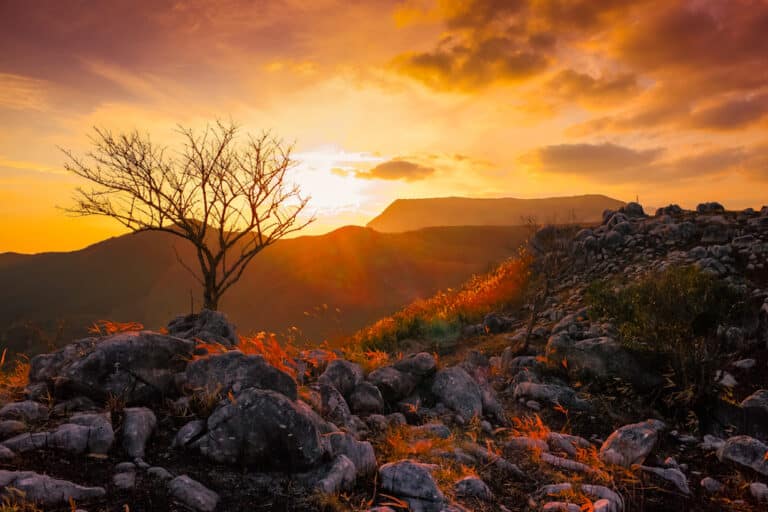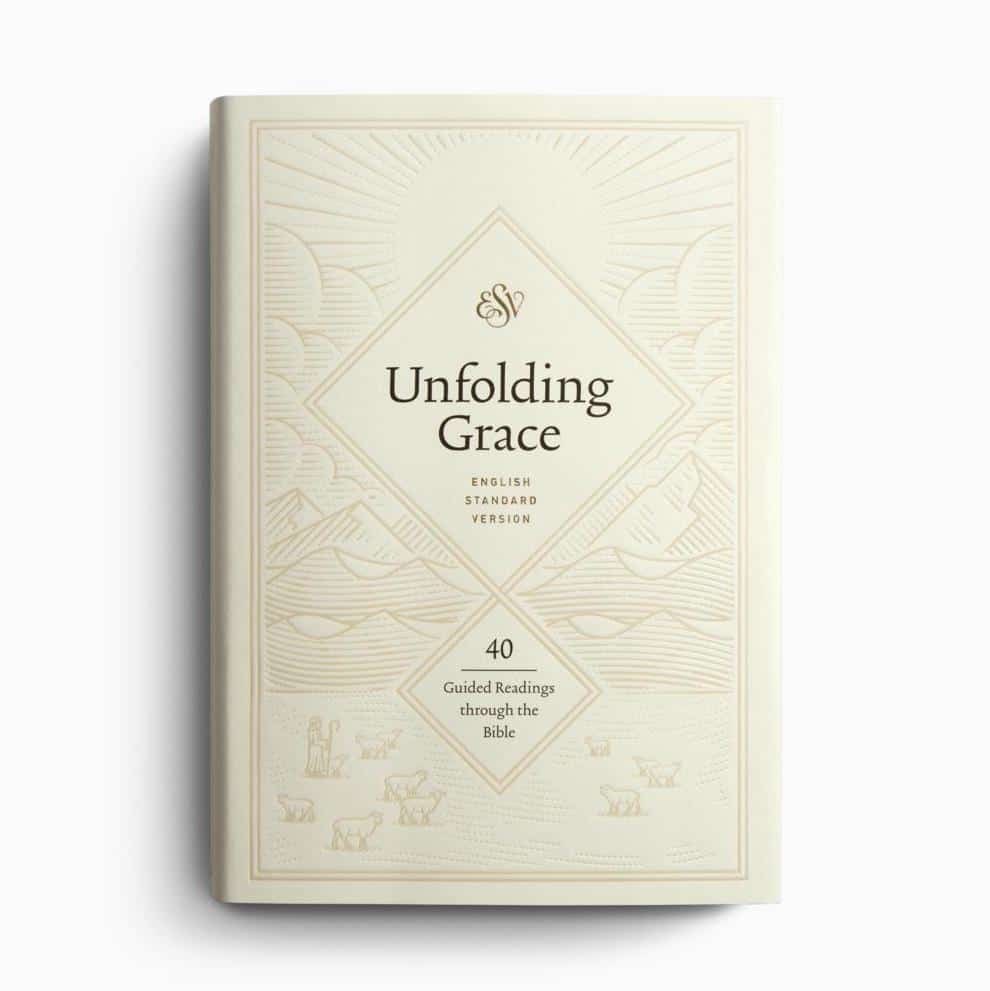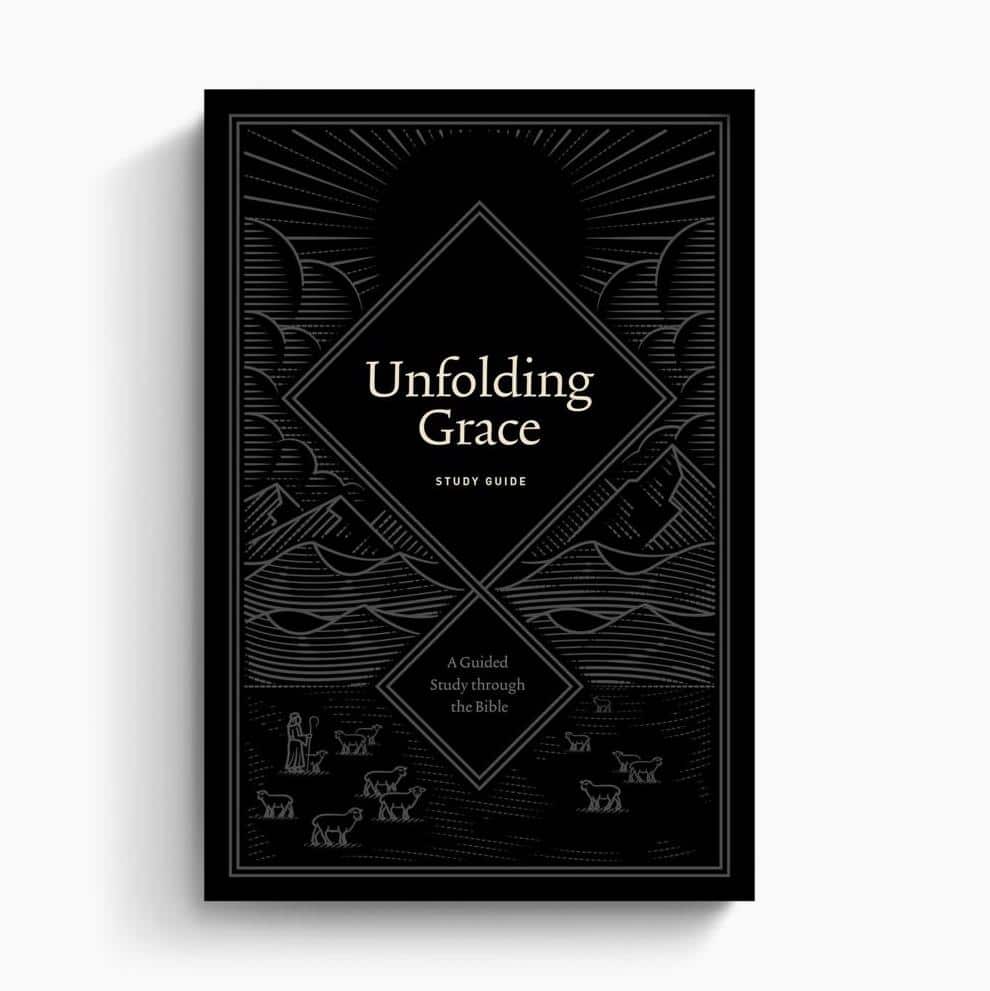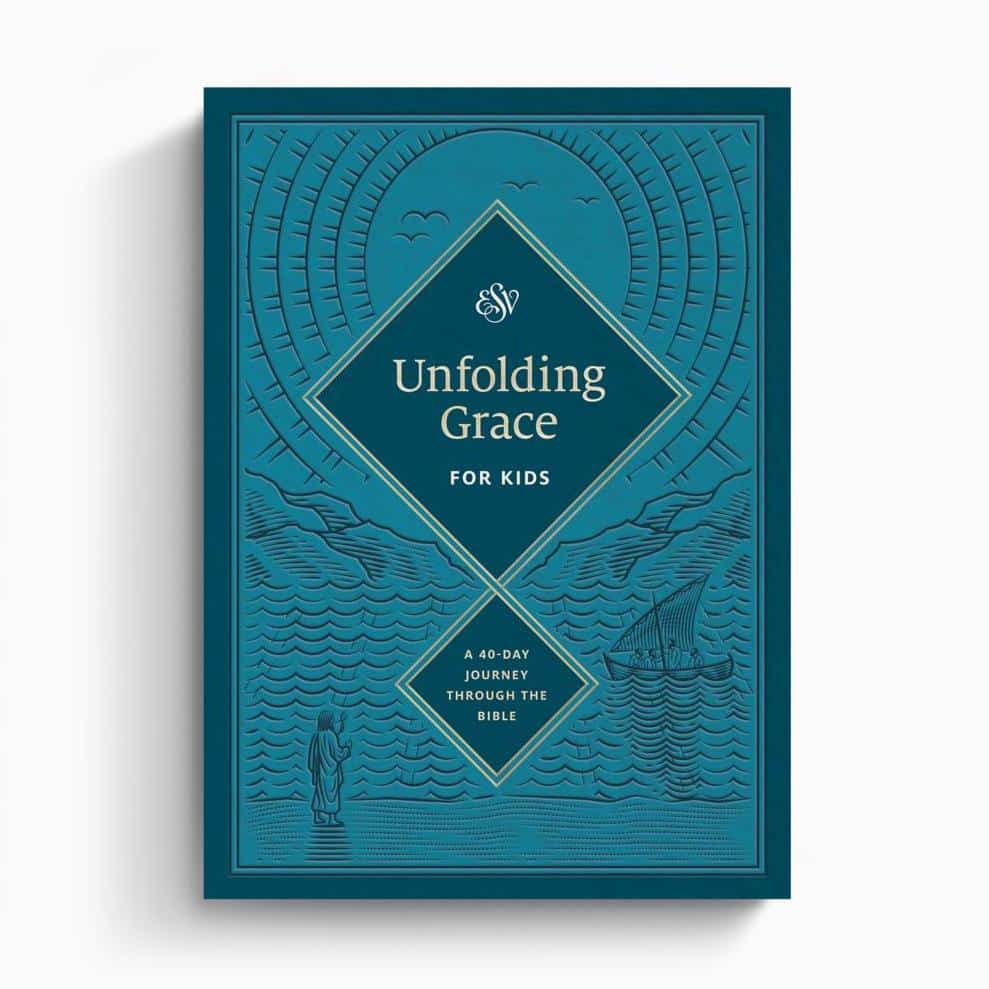LESSON TWELVE
Israel’s Journey and Rebellion
At the end of the exodus, with Israel still at Mount Sinai, God graciously filled the tabernacle with his presence. This reminds us of the beginning of the Bible’s story, when God dwelt with humanity in Eden. Adam and Eve were like priests, made to know and worship God. In this way the tabernacle is a symbolic Eden. The tabernacle also anticipates the end of the Bible’s story, when God will once again dwell with his people, this time forever. Israel’s tabernacle is a symbol and foretaste of God’s restored presence with his people.
God also gives Israel instructions for how this holy God could remain with them in the tabernacle. One way is through various offerings and sacrifices. Some of these sacrifices function in ways similar to the Passover lambs in the exodus story—as substitutes. The priest puts his hands on the animal to symbolize the transfer of the people’s sins to the animal, and then the animal dies so that the people may live. These acts point forward to the true and greater sacrifice to come, the sacrifice of Jesus.
With these gracious provisions, Israel sets out toward their new home in Canaan. But in the following story from Numbers we see that their hearts still have not changed.
SCRIPTURE READING
Numbers 10-14
Reading Time: 20 Minutes
The Lord spoke to Moses, saying, “Make two silver trumpets. Of hammered work you shall make them, and you shall use them for summoning the congregation and for breaking camp. And when both are blown, all the congregation shall gather themselves to you at the entrance of the tent of meeting. But if they blow only one, then the chiefs, the heads of the tribes of Israel, shall gather themselves to you. When you blow an alarm, the camps that are on the east side shall set out. And when you blow an alarm the second time, the camps that are on the south side shall set out. An alarm is to be blown whenever they are to set out. But when the assembly is to be gathered together, you shall blow a long blast, but you shall not sound an alarm. And the sons of Aaron, the priests, shall blow the trumpets. The trumpets shall be to you for a perpetual statute throughout your generations. And when you go to war in your land against the adversary who oppresses you, then you shall sound an alarm with the trumpets, that you may be remembered before the Lord your God, and you shall be saved from your enemies. On the day of your gladness also, and at your appointed feasts and at the beginnings of your months, you shall blow the trumpets over your burnt offerings and over the sacrifices of your peace offerings. They shall be a reminder of you before your God: I am the Lord your God.”
In the second year, in the second month, on the twentieth day of the month, the cloud lifted from over the tabernacle of the testimony, and the people of Israel set out by stages from the wilderness of Sinai. And the cloud settled down in the wilderness of Paran. They set out for the first time at the command of the Lord by Moses. The standard of the camp of the people of Judah set out first by their companies, and over their company was Nahshon the son of Amminadab. And over the company of the tribe of the people of Issachar was Nethanel the son of Zuar. And over the company of the tribe of the people of Zebulun was Eliab the son of Helon.
And when the tabernacle was taken down, the sons of Gershon and the sons of Merari, who carried the tabernacle, set out. And the standard of the camp of Reuben set out by their companies, and over their company was Elizur the son of Shedeur. And over the company of the tribe of the people of Simeon was Shelumiel the son of Zurishaddai. And over the company of the tribe of the people of Gad was Eliasaph the son of Deuel.
Then the Kohathites set out, carrying the holy things, and the tabernacle was set up before their arrival. And the standard of the camp of the people of Ephraim set out by their companies, and over their company was Elishama the son of Ammihud. And over the company of the tribe of the people of Manasseh was Gamaliel the son of Pedahzur. And over the company of the tribe of the people of Benjamin was Abidan the son of Gideoni.
Then the standard of the camp of the people of Dan, acting as the rear guard of all the camps, set out by their companies, and over their company was Ahiezer the son of Ammishaddai. And over the company of the tribe of the people of Asher was Pagiel the son of Ochran. And over the company of the tribe of the people of Naphtali was Ahira the son of Enan. This was the order of march of the people of Israel by their companies, when they set out.
And Moses said to Hobab the son of Reuel the Midianite, Moses’ father-in-law, “We are setting out for the place of which the Lord said, ‘I will give it to you.’ Come with us, and we will do good to you, for the Lord has promised good to Israel.” But he said to him, “I will not go. I will depart to my own land and to my kindred.” And he said, “Please do not leave us, for you know where we should camp in the wilderness, and you will serve as eyes for us. And if you do go with us, whatever good the Lord will do to us, the same will we do to you.”
So they set out from the mount of the Lord three days’ journey. And the ark of the covenant of the Lord went before them three days’ journey, to seek out a resting place for them. And the cloud of the Lord was over them by day, whenever they set out from the camp.
And whenever the ark set out, Moses said, “Arise, O Lord, and let your enemies be scattered, and let those who hate you flee before you.” And when it rested, he said, “Return, O Lord, to the ten thousand thousands of Israel.”
And the people complained in the hearing of the Lord about their misfortunes, and when the Lord heard it, his anger was kindled, and the fire of the Lord burned among them and consumed some outlying parts of the camp. Then the people cried out to Moses, and Moses prayed to the Lord, and the fire died down. So the name of that place was called Taberah, because the fire of the Lord burned among them.
Now the rabble that was among them had a strong craving. And the people of Israel also wept again and said, “Oh that we had meat to eat! We remember the fish we ate in Egypt that cost nothing, the cucumbers, the melons, the leeks, the onions, and the garlic. But now our strength is dried up, and there is nothing at all but this manna to look at.”
Now the manna was like coriander seed, and its appearance like that of bdellium. The people went about and gathered it and ground it in handmills or beat it in mortars and boiled it in pots and made cakes of it. And the taste of it was like the taste of cakes baked with oil. When the dew fell upon the camp in the night, the manna fell with it.
Moses heard the people weeping throughout their clans, everyone at the door of his tent. And the anger of the Lord blazed hotly, and Moses was displeased. Moses said to the Lord, “Why have you dealt ill with your servant? And why have I not found favor in your sight, that you lay the burden of all this people on me? Did I conceive all this people? Did I give them birth, that you should say to me, ‘Carry them in your bosom, as a nurse carries a nursing child,’ to the land that you swore to give their fathers? Where am I to get meat to give to all this people? For they weep before me and say, ‘Give us meat, that we may eat.’ I am not able to carry all this people alone; the burden is too heavy for me. If you will treat me like this, kill me at once, if I find favor in your sight, that I may not see my wretchedness.”
Then the Lord said to Moses, “Gather for me seventy men of the elders of Israel, whom you know to be the elders of the people and officers over them, and bring them to the tent of meeting, and let them take their stand there with you. And I will come down and talk with you there. And I will take some of the Spirit that is on you and put it on them, and they shall bear the burden of the people with you, so that you may not bear it yourself alone. And say to the people, ‘Consecrate yourselves for tomorrow, and you shall eat meat, for you have wept in the hearing of the Lord, saying, “Who will give us meat to eat? For it was better for us in Egypt.” Therefore the Lord will give you meat, and you shall eat. You shall not eat just one day, or two days, or five days, or ten days, or twenty days, but a whole month, until it comes out at your nostrils and becomes loathsome to you, because you have rejected the Lord who is among you and have wept before him, saying, “Why did we come out of Egypt?” ’ ” But Moses said, “The people among whom I am number six hundred thousand on foot, and you have said, ‘I will give them meat, that they may eat a whole month!’ Shall flocks and herds be slaughtered for them, and be enough for them? Or shall all the fish of the sea be gathered together for them, and be enough for them?” And the Lord said to Moses, “Is the Lord’s hand shortened? Now you shall see whether my word will come true for you or not.”
So Moses went out and told the people the words of the Lord. And he gathered seventy men of the elders of the people and placed them around the tent. Then the Lord came down in the cloud and spoke to him, and took some of the Spirit that was on him and put it on the seventy elders. And as soon as the Spirit rested on them, they prophesied. But they did not continue doing it.
Now two men remained in the camp, one named Eldad, and the other named Medad, and the Spirit rested on them. They were among those registered, but they had not gone out to the tent, and so they prophesied in the camp. And a young man ran and told Moses, “Eldad and Medad are prophesying in the camp.” And Joshua the son of Nun, the assistant of Moses from his youth, said, “My lord Moses, stop them.” But Moses said to him, “Are you jealous for my sake? Would that all the Lord’s people were prophets, that the Lord would put his Spirit on them!” And Moses and the elders of Israel returned to the camp.
Then a wind from the Lord sprang up, and it brought quail from the sea and let them fall beside the camp, about a day’s journey on this side and a day’s journey on the other side, around the camp, and about two cubits above the ground. And the people rose all that day and all night and all the next day, and gathered the quail. Those who gathered least gathered ten homers. And they spread them out for themselves all around the camp. While the meat was yet between their teeth, before it was consumed, the anger of the Lord was kindled against the people, and the Lord struck down the people with a very great plague. Therefore the name of that place was called Kibroth-hattaavah, because there they buried the people who had the craving. From Kibroth-hattaavah the people journeyed to Hazeroth, and they remained at Hazeroth.
Miriam and Aaron spoke against Moses because of the Cushite woman whom he had married, for he had married a Cushite woman. And they said, “Has the Lord indeed spoken only through Moses? Has he not spoken through us also?” And the Lord heard it. Now the man Moses was very meek, more than all people who were on the face of the earth. And suddenly the Lord said to Moses and to Aaron and Miriam, “Come out, you three, to the tent of meeting.” And the three of them came out. And the Lord came down in a pillar of cloud and stood at the entrance of the tent and called Aaron and Miriam, and they both came forward. And he said, “Hear my words: If there is a prophet among you, I the Lord make myself known to him in a vision; I speak with him in a dream. Not so with my servant Moses. He is faithful in all my house. With him I speak mouth to mouth, clearly, and not in riddles, and he beholds the form of the Lord. Why then were you not afraid to speak against my servant Moses?” And the anger of the Lord was kindled against them, and he departed.
When the cloud removed from over the tent, behold, Miriam was leprous, like snow. And Aaron turned toward Miriam, and behold, she was leprous. And Aaron said to Moses, “Oh, my lord, do not punish us because we have done foolishly and have sinned. Let her not be as one dead, whose flesh is half eaten away when he comes out of his mother’s womb.” And Moses cried to the Lord, “O God, please heal her—please.” But the Lord said to Moses, “If her father had but spit in her face, should she not be shamed seven days? Let her be shut outside the camp seven days, and after that she may be brought in again.” So Miriam was shut outside the camp seven days, and the people did not set out on the march till Miriam was brought in again. After that the people set out from Hazeroth, and camped in the wilderness of Paran.
The Lord spoke to Moses, saying, “Send men to spy out the land of Canaan, which I am giving to the people of Israel. From each tribe of their fathers you shall send a man, every one a chief among them.” So Moses sent them from the wilderness of Paran, according to the command of the Lord, all of them men who were heads of the people of Israel. And these were their names: From the tribe of Reuben, Shammua the son of Zaccur; from the tribe of Simeon, Shaphat the son of Hori; from the tribe of Judah, Caleb the son of Jephunneh; from the tribe of Issachar, Igal the son of Joseph; from the tribe of Ephraim, Hoshea the son of Nun; from the tribe of Benjamin, Palti the son of Raphu; from the tribe of Zebulun, Gaddiel the son of Sodi; from the tribe of Joseph (that is, from the tribe of Manasseh), Gaddi the son of Susi; from the tribe of Dan, Ammiel the son of Gemalli; from the tribe of Asher, Sethur the son of Michael; from the tribe of Naphtali, Nahbi the son of Vophsi; from the tribe of Gad, Geuel the son of Machi. These were the names of the men whom Moses sent to spy out the land. And Moses called Hoshea the son of Nun Joshua.
Moses sent them to spy out the land of Canaan and said to them, “Go up into the Negeb and go up into the hill country, and see what the land is, and whether the people who dwell in it are strong or weak, whether they are few or many, and whether the land that they dwell in is good or bad, and whether the cities that they dwell in are camps or strongholds, and whether the land is rich or poor, and whether there are trees in it or not. Be of good courage and bring some of the fruit of the land.” Now the time was the season of the first ripe grapes.
So they went up and spied out the land from the wilderness of Zin to Rehob, near Lebo-hamath. They went up into the Negeb and came to Hebron. Ahiman, Sheshai, and Talmai, the descendants of Anak, were there. (Hebron was built seven years before Zoan in Egypt.) And they came to the Valley of Eshcol and cut down from there a branch with a single cluster of grapes, and they carried it on a pole between two of them; they also brought some pomegranates and figs. That place was called the Valley of Eshcol, because of the cluster that the people of Israel cut down from there.
At the end of forty days they returned from spying out the land. And they came to Moses and Aaron and to all the congregation of the people of Israel in the wilderness of Paran, at Kadesh. They brought back word to them and to all the congregation, and showed them the fruit of the land. And they told him, “We came to the land to which you sent us. It flows with milk and honey, and this is its fruit. However, the people who dwell in the land are strong, and the cities are fortified and very large. And besides, we saw the descendants of Anak there. The Amalekites dwell in the land of the Negeb. The Hittites, the Jebusites, and the Amorites dwell in the hill country. And the Canaanites dwell by the sea, and along the Jordan.”
But Caleb quieted the people before Moses and said, “Let us go up at once and occupy it, for we are well able to overcome it.” Then the men who had gone up with him said, “We are not able to go up against the people, for they are stronger than we are.” So they brought to the people of Israel a bad report of the land that they had spied out, saying, “The land, through which we have gone to spy it out, is a land that devours its inhabitants, and all the people that we saw in it are of great height. And there we saw the Nephilim (the sons of Anak, who come from the Nephilim), and we seemed to ourselves like grasshoppers, and so we seemed to them.”
Then all the congregation raised a loud cry, and the people wept that night. And all the people of Israel grumbled against Moses and Aaron. The whole congregation said to them, “Would that we had died in the land of Egypt! Or would that we had died in this wilderness! Why is the Lord bringing us into this land, to fall by the sword? Our wives and our little ones will become a prey. Would it not be better for us to go back to Egypt?” And they said to one another, “Let us choose a leader and go back to Egypt.”
Then Moses and Aaron fell on their faces before all the assembly of the congregation of the people of Israel. And Joshua the son of Nun and Caleb the son of Jephunneh, who were among those who had spied out the land, tore their clothes and said to all the congregation of the people of Israel, “The land, which we passed through to spy it out, is an exceedingly good land. If the Lord delights in us, he will bring us into this land and give it to us, a land that flows with milk and honey. Only do not rebel against the Lord. And do not fear the people of the land, for they are bread for us. Their protection is removed from them, and the Lord is with us; do not fear them.” Then all the congregation said to stone them with stones. But the glory of the Lord appeared at the tent of meeting to all the people of Israel.
And the Lord said to Moses, “How long will this people despise me? And how long will they not believe in me, in spite of all the signs that I have done among them? I will strike them with the pestilence and disinherit them, and I will make of you a nation greater and mightier than they.”
But Moses said to the Lord, “Then the Egyptians will hear of it, for you brought up this people in your might from among them, and they will tell the inhabitants of this land. They have heard that you, O Lord, are in the midst of this people. For you, O Lord, are seen face to face, and your cloud stands over them and you go before them, in a pillar of cloud by day and in a pillar of fire by night. Now if you kill this people as one man, then the nations who have heard your fame will say, ‘It is because the Lord was not able to bring this people into the land that he swore to give to them that he has killed them in the wilderness.’ And now, please let the power of the Lord be great as you have promised, saying, ‘The Lord is slow to anger and abounding in steadfast love, forgiving iniquity and transgression, but he will by no means clear the guilty, visiting the iniquity of the fathers on the children, to the third and the fourth generation.’ Please pardon the iniquity of this people, according to the greatness of your steadfast love, just as you have forgiven this people, from Egypt until now.”
Then the Lord said, “I have pardoned, according to your word. But truly, as I live, and as all the earth shall be filled with the glory of the Lord, none of the men who have seen my glory and my signs that I did in Egypt and in the wilderness, and yet have put me to the test these ten times and have not obeyed my voice, shall see the land that I swore to give to their fathers. And none of those who despised me shall see it. But my servant Caleb, because he has a different spirit and has followed me fully, I will bring into the land into which he went, and his descendants shall possess it. Now, since the Amalekites and the Canaanites dwell in the valleys, turn tomorrow and set out for the wilderness by the way to the Red Sea.”
And the Lord spoke to Moses and to Aaron, saying, “How long shall this wicked congregation grumble against me? I have heard the grumblings of the people of Israel, which they grumble against me. Say to them, ‘As I live, declares the Lord, what you have said in my hearing I will do to you: your dead bodies shall fall in this wilderness, and of all your number, listed in the census from twenty years old and upward, who have grumbled against me, not one shall come into the land where I swore that I would make you dwell, except Caleb the son of Jephunneh and Joshua the son of Nun. But your little ones, who you said would become a prey, I will bring in, and they shall know the land that you have rejected. But as for you, your dead bodies shall fall in this wilderness. And your children shall be shepherds in the wilderness forty years and shall suffer for your faithlessness, until the last of your dead bodies lies in the wilderness. According to the number of the days in which you spied out the land, forty days, a year for each day, you shall bear your iniquity forty years, and you shall know my displeasure.’ I, the Lord, have spoken. Surely this will I do to all this wicked congregation who are gathered together against me: in this wilderness they shall come to a full end, and there they shall die.”
And the men whom Moses sent to spy out the land, who returned and made all the congregation grumble against him by bringing up a bad report about the land—the men who brought up a bad report of the land—died by plague before the Lord. Of those men who went to spy out the land, only Joshua the son of Nun and Caleb the son of Jephunneh remained alive.
When Moses told these words to all the people of Israel, the people mourned greatly. And they rose early in the morning and went up to the heights of the hill country, saying, “Here we are. We will go up to the place that the Lord has promised, for we have sinned.” But Moses said, “Why now are you transgressing the command of the Lord, when that will not succeed? Do not go up, for the Lord is not among you, lest you be struck down before your enemies. For there the Amalekites and the Canaanites are facing you, and you shall fall by the sword. Because you have turned back from following the Lord, the Lord will not be with you.” But they presumed to go up to the heights of the hill country, although neither the ark of the covenant of the Lord nor Moses departed out of the camp. Then the Amalekites and the Canaanites who lived in that hill country came down and defeated them and pursued them, even to Hormah.
NUMBERS 10-14
Study Guide Questions
- What are several ways in which these chapters demonstrate different aspects of the nature of sin?
- What does this section teach us about why complaining and grumbling in life is a significant spiritual problem?
NUMBERS 13:25–14:25
Family Discussion Questions
- How do we see the sinfulness of people in this story?
- The spies were fearful and said there was no way that Israel could enter and overtake the land. But who or what were they forgetting about?
- What is the difference between the “bad report” and the “good report” of the land?
- What was different about Joshua and Caleb compared to the rest of Israel?
- Israel said they would rather go back to Egypt than trust God and enter the land. How does this show that their sin isn’t just wrong, but foolish?
PART TWO REVIEW
God’s People Redeemed
God multiplies the Israelites while they are in Egypt. Yet, while the people of Israel grow in number, they also cry out because of their slavery to the Egyptians. God chooses to deliver them by raising up Moses as their leader. After a series of judgments on Egypt, God leads his people out from Egypt through the Red Sea. He then brings them to the foot of Mount Sinai in order to enter into a covenant relationship with them. Israel is to become a new humanity, a kingdom of priests restored to God and reflecting his character in the world. God also causes his presence to dwell with his people in the tabernacle. He brings them out of slavery in order to bring them near to him; he delivers them in order to dwell with them.
From Sinai, God will lead his people to their new home, the land of Canaan. However, Israel continually distrusts and disobeys the Lord. Because of this, God causes them to wander in the wilderness for forty years until this first generation passes away. The next generation will be another fresh start, and God leads them into the land through Joshua, their new Moses-like leader.
LESSON TWELVE
Israel’s Journey and Rebellion
Moses built the tabernacle, and then God graciously filled it with his presence. He also gave instructions for animal sacrifice, which was the way in which sinners could receive forgiveness and remain right with God. A priest would put his hands on the animal to symbolize the transfer of the person’s sins to the animal, and then the animal would die so that the one who gave the sacrifice could live. This pointed forward to the true and greater sacrifice to come, the sacrifice of Jesus.
The tabernacle is about God’s presence with his people. It reminds us of the past and points to the future. First, it reminds us of the beginning of the Bible’s story, when God dwelt with people in Eden. Second, the tabernacle points forward to the end of the Bible’s story, when God will once again dwell with his people—this time forever.
With the tabernacle and sacrifices, Israel set out toward its new home in Canaan. But in the following story from Numbers we see that the people’s hearts still had not changed.
SCRIPTURE READING
Numbers 13:25-14:25
Reading Time: 5 Minutes
At the end of forty days they returned from spying out the land. And they came to Moses and Aaron and to all the congregation of the people of Israel in the wilderness of Paran, at Kadesh. They brought back word to them and to all the congregation, and showed them the fruit of the land. And they told him, “We came to the land to which you sent us. It flows with milk and honey, and this is its fruit. However, the people who dwell in the land are strong, and the cities are fortified and very large. And besides, we saw the descendants of Anak there. The Amalekites dwell in the land of the Negeb. The Hittites, the Jebusites, and the Amorites dwell in the hill country. And the Canaanites dwell by the sea, and along the Jordan.”
But Caleb quieted the people before Moses and said, “Let us go up at once and occupy it, for we are well able to overcome it.” Then the men who had gone up with him said, “We are not able to go up against the people, for they are stronger than we are.” So they brought to the people of Israel a bad report of the land that they had spied out, saying, “The land, through which we have gone to spy it out, is a land that devours its inhabitants, and all the people that we saw in it are of great height. And there we saw the Nephilim (the sons of Anak, who come from the Nephilim), and we seemed to ourselves like grasshoppers, and so we seemed to them.”
Then all the congregation raised a loud cry, and the people wept that night. And all the people of Israel grumbled against Moses and Aaron. The whole congregation said to them, “Would that we had died in the land of Egypt! Or would that we had died in this wilderness! Why is the Lord bringing us into this land, to fall by the sword? Our wives and our little ones will become a prey. Would it not be better for us to go back to Egypt?” And they said to one another, “Let us choose a leader and go back to Egypt.”
Then Moses and Aaron fell on their faces before all the assembly of the congregation of the people of Israel. And Joshua the son of Nun and Caleb the son of Jephunneh, who were among those who had spied out the land, tore their clothes and said to all the congregation of the people of Israel, “The land, which we passed through to spy it out, is an exceedingly good land. If the Lord delights in us, he will bring us into this land and give it to us, a land that flows with milk and honey. Only do not rebel against the Lord. And do not fear the people of the land, for they are bread for us. Their protection is removed from them, and the Lord is with us; do not fear them.” Then all the congregation said to stone them with stones. But the glory of the Lord appeared at the tent of meeting to all the people of Israel.
And the Lord said to Moses, “How long will this people despise me? And how long will they not believe in me, in spite of all the signs that I have done among them? I will strike them with the pestilence and disinherit them, and I will make of you a nation greater and mightier than they.”
But Moses said to the Lord, “Then the Egyptians will hear of it, for you brought up this people in your might from among them, and they will tell the inhabitants of this land. They have heard that you, O Lord, are in the midst of this people. For you, O Lord, are seen face to face, and your cloud stands over them and you go before them, in a pillar of cloud by day and in a pillar of fire by night. Now if you kill this people as one man, then the nations who have heard your fame will say, ‘It is because the Lord was not able to bring this people into the land that he swore to give to them that he has killed them in the wilderness.’ And now, please let the power of the Lord be great as you have promised, saying, ‘The Lord is slow to anger and abounding in steadfast love, forgiving iniquity and transgression, but he will by no means clear the guilty, visiting the iniquity of the fathers on the children, to the third and the fourth generation.’ Please pardon the iniquity of this people, according to the greatness of your steadfast love, just as you have forgiven this people, from Egypt until now.”
Then the Lord said, “I have pardoned, according to your word. But truly, as I live, and as all the earth shall be filled with the glory of the Lord, none of the men who have seen my glory and my signs that I did in Egypt and in the wilderness, and yet have put me to the test these ten times and have not obeyed my voice, shall see the land that I swore to give to their fathers. And none of those who despised me shall see it. But my servant Caleb, because he has a different spirit and has followed me fully, I will bring into the land into which he went, and his descendants shall possess it. Now, since the Amalekites and the Canaanites dwell in the valleys, turn tomorrow and set out for the wilderness by the way to the Red Sea.”
SERMON SERIES
Finding Our Purpose in God’s Plan
These six messages belong to the Unfolding Grace: Finding Our Purpose in God’s Plan sermon series that author and pastor Drew Hunter preached at his home church. Through these six messages, he tells us the story of the Bible—a story that reveals the grace of God.
BUY THE BOOK
Book Series
The content you enjoy in this Unfolding Grace Reading Plan comes from the Unfolding Grace book series by Pastor Drew Hunter, published by Crossway Publishers. We encourage you to purchase a physical copy of Unfolding Grace to use individually, with your family, or as a small group.








